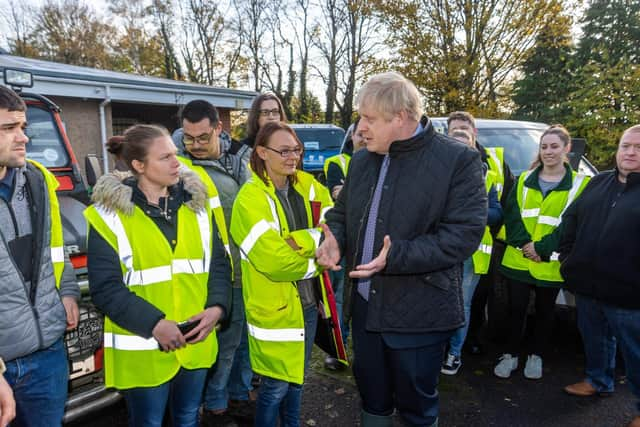Why Yorkshire doesn't need Boris Johnson to visit next time there's a flood, we just need his money
And it's no slight intended to the Prime Minister to suggest that this minor inconvenience is as close as he - or any senior politician - is likely to get in the near future to a personal experience like that of the thousands of people forced from their homes by floods in recent days.
On a quiet Westminster recess week, his absence from the political fray has been noted by some who suggest the PM should have been donning waterproof footwear and visiting flood-hit areas in Yorkshire and the rest of the country.
Advertisement
Hide AdAdvertisement
Hide AdEmerging from his post-election torpor, Labour leader Jeremy Corbyn did just this in South Wales and suggested Mr Johnson only cared about flood-hit communities if an election was on.
It was the same story last month when he was criticised for his hands-off approach as he remained on holiday - though still working - in the days after Donald Trump ordered the killing of top Iranian general Qassem Soleimani.
Mr Johnson and his team are anxious to avoid the mistakes of New Labour under Tony Blair, who never missed a photo opportunity but was frustrated by his lack of progress on policy in his first term as Prime Minister.


With an 80-seat majority and an enfeebled opposition, Mr Johnson will never be in a better position than he is now to make headway on the potentially controversial issues in his in-tray which could define his premiership.
Advertisement
Hide AdAdvertisement
Hide AdAll of which means he is less inclined to personally front up the government response to day-to-day challenges like flooding, even if it means a few days of bad headlines.
Iain Bundred, a former adviser to Gordon Brown, this week admitted on Twitter that he still wasn't sure whether his boss's visit to flood-hit Cockermouth in 2009 was the right thing to do.
"I think this administration has not yet done harm by avoiding some of the day to day media responsiveness that we used to employ", he wrote.
Mr Johnson did of course visit the areas of Yorkshire affected by flooding during last year's General Election campaign, with limited evidence that his visit did anything for the local communities or his own cause.
Advertisement
Hide AdAdvertisement
Hide AdAn initial visit where he declared the floods in South Yorkshire were not a national emergency forced him onto the defensive, with a second visit a few days later seeing him lambasted by angry locals.
And for all the publicity which came from his appearance, it took three months before one of the key asks from local leaders - a summit to tackle Yorkshire flooding - was agreed by government.
Yorkshire leaders I spoke to this week agreed that Prime Ministerial visits have drawbacks as well as advantages.
The security cover required potentially distracts police and other services from the task at hand, undermining the recovery effort in the immediate aftermath of heavy flooding.
Advertisement
Hide AdAdvertisement
Hide AdA visit once the worst is over is considered helpful as a show of support and as an opportunity for the PM to review the recovery efforts and the resources attached to them.
But more important than the personal presence of one man is letting the communities in the grip of a crisis know that Whitehall is working to support local efforts on the ground.
One leader told me: "We currently seem to have the worst of all worlds. No PM, only fleeting ministerial presence and no grip from wider government. DEFRA have been useless."
Ministers would doubtless disagree, pointing to the package of support released under the Flood Recovery Framework this week which will allow home-owners and businesses to apply for up to £5,000 to make them more resilient.
Advertisement
Hide AdAdvertisement
Hide AdBut the failure to convene the emergency COBRA committee to get a grip on the crisis, as the Government did after the Yorkshire floods of 2015 and 2019, has led to local leaders describing the Government response as "slow and disjointed".
Climate change means heavy rainfall is likely to become a fact of life for areas like the Calder Valley, yet calls for funding to pay for schemes which would protect them from flooding remain unanswered.
West Yorkshire's combined authority this week reminded Ministers of an existing request for flood defence measures worth £125m for areas like York, Keighley and Hebden Bridge which has yet to receive a response.
And leaders in Leeds are seemingly no closer to getting the £23m the city needs to complete its defences and prevent a repeat of the 2015 floods.
Advertisement
Hide AdAdvertisement
Hide AdCommitting to these vital schemes - and others like them - would be an easy win in aid of what the Government has described as it's "infrastructure revolution".
And doing so in next month's Budget will mean the PM's week spent away from the limelight at Chevening will turn out to have been time well spent.